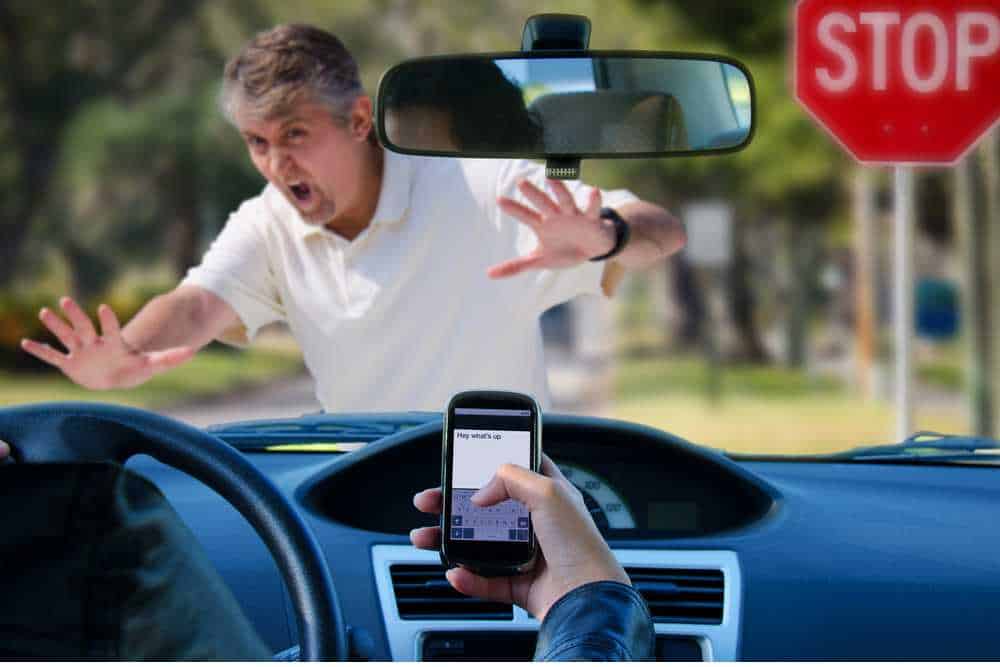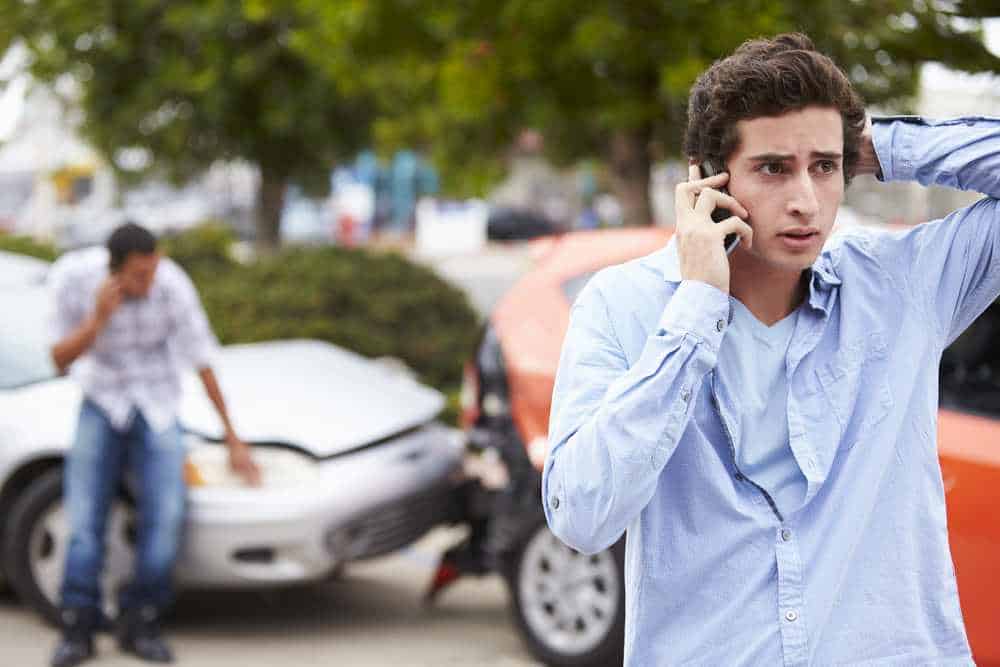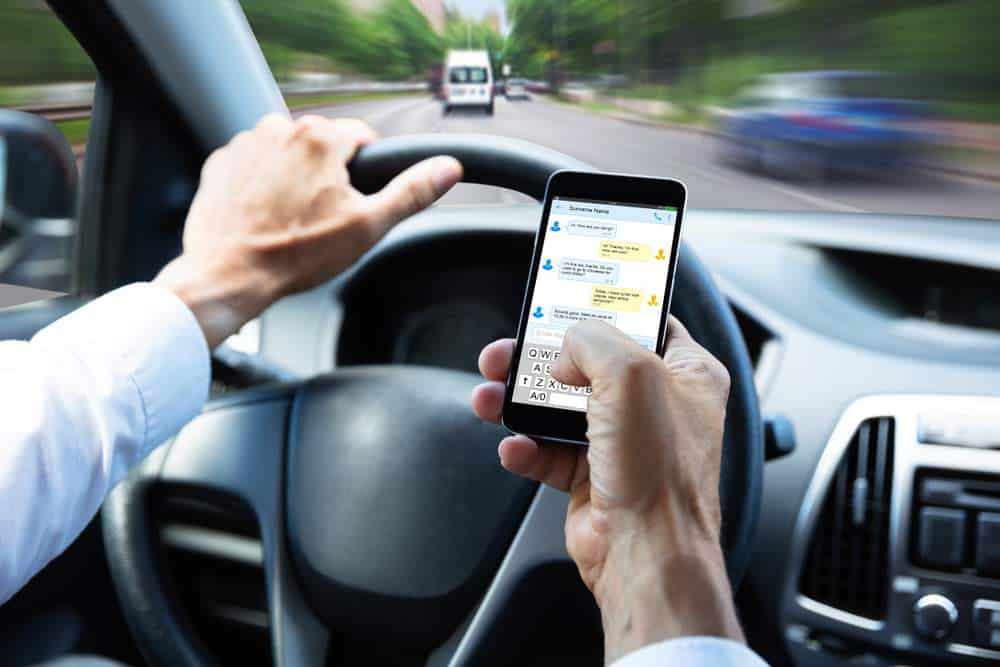You never think a car accident will happen to you… until it does. It is so important to stay alert while driving to help keep you and others around you safe. You will be faced with a lot of distractions while driving, from both things going on inside and outside of your car to personal issues that may prevent you from fully concentrating on the road. Distractions can prevent you from being prepared if a car swerves in front of you or a pedestrian suddenly steps into your path. Will you be able to steer away safely or move out of the way from debris in the road? Split-second decisions while driving can make a difference between staying safe and getting into a car accident. Driver distractions can pose a risk to road safety for everyone around you, so you want to pay attention to what distractions might prevent you from fully focusing on the task at hand.

10 Types of Distracted Driving
Here are ten examples of the most common distractions you might deal with as a driver.
Cell Phone
Cell phones have become part of our everyday lives, and you likely depend on yours for communications with loved ones, emails for work, and entertainment. Many states have implemented stricter driving laws by restricting texting while driving because it is such a distraction for drivers. Even if you are at a red light, scrolling through your phone can cause you to miss a light change and affect drivers around you.
Reading a Map
Thanks to GPS and other digital map services, it has never been easier to get where you need to go. But everyone still gets lost from time to time, especially when you are in an unfamiliar place. Reading a map, even if it’s on a screen built into your dashboard, can distract you from what’s in front of you on the road.
Roadside Activities
From traffic accidents to roadside construction, activities on or around you can really become a distraction. Drivers tend to slow down when passing police, ambulances, and fire trucks tending to an emergency. Flashy billboards and other outdoor advertising can also distract you from the road.
Eating & Drinking
You might grab a bite to eat while on the road a lot, but that doesn’t mean it’s a safe practice. Eating and drinking can occupy one or both hands, leaving you with less control over your vehicle. When your hands are busy with food or drink, you might not be able to respond as quickly to a sudden issue.
Fallen Items
While you might be tempted to reach for your phone that slid under your seat or that hairbrush that fell at your feet, fallen items can be a serious distraction. In fact, fallen items can cause you to take your eyes off the road and bend or stretch to reach for something, leaving you with little or no reaction time if a serious event occurs on the road ahead.
Changing the Radio
You have so many options when listening to music on the radio that you might find yourself toggling between stations or queuing up your favorite playlist. However, changing stations or playing music from your phone to car speakers can distract you when you take your eyes off the road.
Talking to Passengers
Everyone loves company, but sometimes passengers can also distract you from the task at hand. Whether you are conversing with other adults in the vehicle or tending to children in the backseat, you want to make sure you have a firm grip on the wheel and stay alert.
Drowsiness
A long day can leave you feeling tired, and all you want to do is get home. However, drowsiness can severely impact your ability to drive safely. When you are tired, you simply can’t be as alert as you should be when on the road. Driving while drowsy has even been known to impair your alertness and critical thinking the same way drunk driving can.
Strong Emotions
Strong emotions like anger and grief can break your focus and prevent you from concentrating on driving. Mental and emotional distractions like frustration with yourself or others can keep you from staying safe on the road.
Drugs & Alcohol
Never drive under the influence of drugs or alcohol while driving a car. Not only is drunk driving extremely dangerous for everyone involved, but you also simply cannot have the concentration and alertness necessary to keep you and others safe.
How to Avoid Distractions on the Road
When you are driving, you want to do everything in your power to stay focused and alert on the task at hand. That means you need to be aware of potential distractions and remind yourself to stay focused on driving. Avoid keeping your eyes off the road for too long, and always check your mirrors and blind spots before changing lanes or turning. Try to skip eating and drinking while you’re driving to avoid fumbling with any wrappers or dealing with any accidental spills that may distract you further. Additionally, when you plan your trip in advance, you can give yourself enough time to stop and eat, change clothes, fix your hair and makeup, and other things that can keep you from fully paying attention to the road.

What to Do If You Get in a Car Accident
If you do get into a car accident, you always want to put your health and safety first. No matter whether you were at fault or not, it is important to get prompt medical treatment. Even if you don’t notice any pain or other symptoms right away, a car accident doctor can perform a thorough examination to ensure you don’t have any internal car accident injuries that might come with delayed symptoms. In the event of an unfortunate accident, consider visiting your car accident chiropractor at Killeen Chiropractic to get checked out and get started on a treatment plan that’s right for you.

